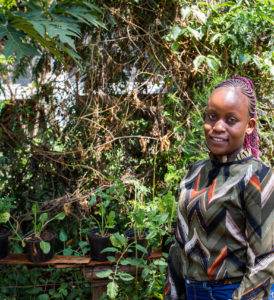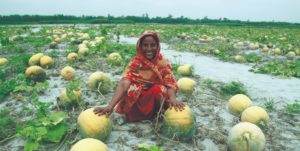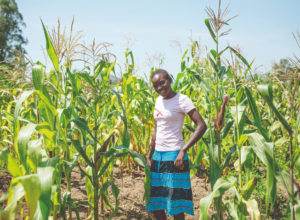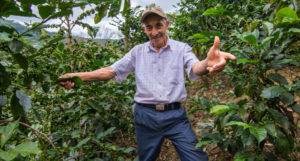Find out more about sustainable food, what makes it so essential for the wellbeing of humankind and the ingenious solutions already being used by farmers around the world.
Why is sustainable food important?
Achieving sustainable food systems, both nationally and globally, is essential for the wellbeing (and survival) of all humankind.
Sustainability has many dimensions; ecological, social and economic. It also includes the ability to continue in the face of climate change – adaptation.

In Kenya, Mercy uses her poultry farm to produce her own manure that can be then used in her vegetable garden.
How do we achieve sustainable food systems?
Ecological sustainability of food systems requires agriculture to function without degrading soils, land, water or biodiversity – i.e. without damaging the ecosystems on which we and agriculture depend. This means maintaining levels of soil organic matter and soil microbes which provide the nutrients and soil structure that plants need – soils that retain moisture and have inherent fertility that crops need to be productive and resilient. It also means looking after all land and water from the mountains to the sea.
Social sustainability of food systems requires agriculture to work for the majority, especially smallholder farmers, female headed households and young people living in rural areas in developing countries. Also, for consumers by providing affordable, nutritious, safe and culturally relevant food, once again, especially food for the rapidly escalating urban populations in developing countries. It is our view that if local and national food systems do not sustainably deliver this, then it will be impossible to achieve the Sustainable Development Goals – SDGs, notably SDG2 (eradication of food insecurity), SDG5 (gender equality), SDG8 (decent work and economic growth), SDG12 (responsible production and consumption) and SDG13 (climate action). Shipping intensively farmed excess production from developed nations is not sustainable food and undermines any chance of achieving the SDGs.
Economic sustainability of food systems requires agriculture to be viable for all market actors in the long run, especially smallholder farmers in developing countries. True economic sustainability requires “true cost accounting” – i.e. including the environmental cost of fossil fuels used in making inputs and production. This means taking an honest look at input subsidies, carbon footprints and the cost of waste.
Working on (promoting) sustainable food without considering all three dimensions is likely to lead to failure of our agriculture and food systems in the long run. Some call this maladaptation.

With our support, smallholder farmers in Bangladesh are growing food for their families and communities on land that was once thought of as barren due to climate-related flooding.
What is Practical Action doing?
Practical Action believes the current private sector interest in “regenerative agriculture” is a great entry point to addressing environmental and economic sustainability. Simply put regenerative agriculture is farming that looks after soil fertility, biodiversity, water and the wider ecosystem within which the farming takes place. If it can be done whilst also looking at social sustainability, then we have a chance of achieving sustainable food and agriculture. In practice this means companies, governments and development agencies need to ensure that regenerative agriculture includes and benefits the large number of rural people that conventional, non-regenerative agriculture tends to leave behind.
Achieving sustainable food systems is essential for our wellbeing and survival. The stakes couldn’t be higher. But smallholder farmers around the world are proving that, with the right skills and know-how, a sustainable future for the world’s food systems is possible.
Author

Chris Henderson
Chris Henderson led our agricultural work for over 10 years, providing support to projects in Bangladesh, Nepal, Sudan, Kenya, Zimbabwe, Senegal, Peru and Bolivia.

